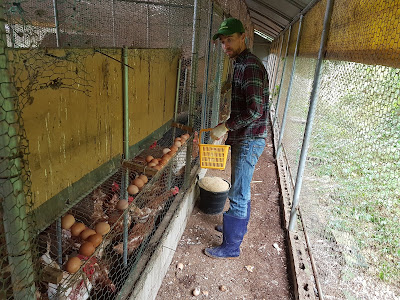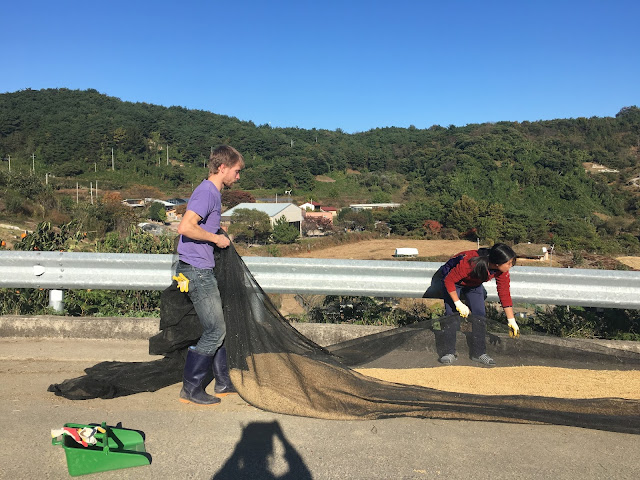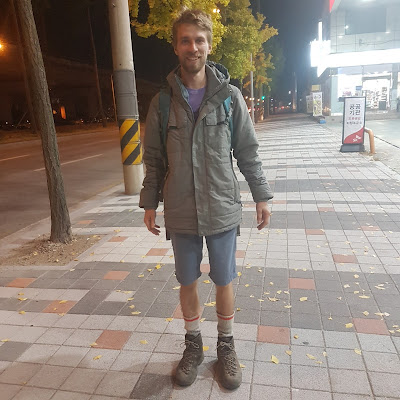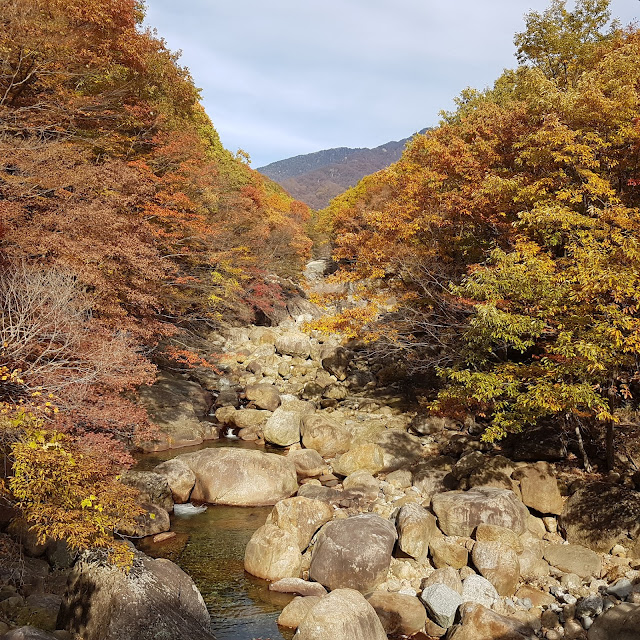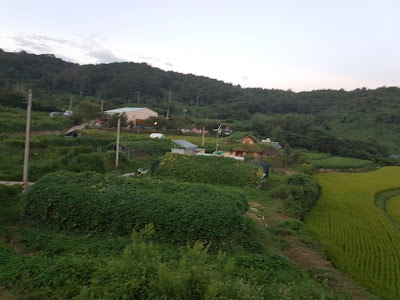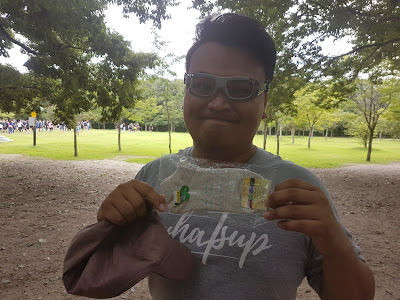This is a devotional I shared at the Dandelion Community Church on October 15th. Translated by Yehyouk Kim.
사랑 나무
Love Tree
I. The Relationship of Neighbour Love and Romance
I have been reading this book [Kierkegaard's
Works of Love] for my morning devotionals since I arrived in the Dandelion Community. It is a book about Christian love – the kind of love that Jesus commands us to have for our neighbours.
저는 민들레에 도착한 이후로 아침마다 아침 예배 시간에 이 책을 읽었습니다. 이 책은 기독교 사랑에 대한 책입니다 - 예수님이 우리에게 명령하신 이웃 사랑에 대한 책입니다.
This book has helped me to think about the relationship between the neighbour love that Jesus commands us to have and romantic or erotic love. This is what I’d like to share with you about this morning.
이 책은 예수님이 우리에게 갖기를 명령하신 이웃 사랑과 낭만적 인 또는 에로틱 한 사랑 사이의 관계에 대해 생각하게 해주었습니다. 오늘 아침에 여러분과 얘기를 나누고 싶었습니다.
“Love” is a word that names many different things. So, just because loving your neighbour as Jesus commanded and having a crush on someone are both called “love,” does not mean that they are the same thing. Just because you fall in love does not mean you are following Jesus’ command.
"사랑"은 여러 가지 다른 이름을 짓는 단어입니다. 그래서, 예수님이 명하신 것처럼 당신의 이웃을 사랑하라는 명령이, 단순히 누군가에게 호감을 느끼기는 수준의 사랑이 아닙니다. 둘 다 "사랑"이라고 불리지만 둘이 똑같은 것을 의미하지는 않습니다. 당신이 사랑에 빠졌다고 해서 당신이 예수님의 명령을 따르고 있다는 것을 의미하지는 않습니다.
But if they are not the same thing, then how are neighbour love and romantic love related? Are we supposed to act one way to our neighbour and another way to someone we are in love with?
그러나 이 두가지가 똑같지 않다면 이웃 사랑과 낭만적 사랑은 어떻게 관련되어 있습니까? 우리는 그냥 이웃에게 한 가지 방법으로 행동하고 또 우리가 사랑하는 사람에게는 다른 방법으로 사랑합니까?
Kierkegaard’s answer is to say, yes not everything we call “love” is neighbour love, but, for Christians, everything we call “love,” whatever else it is, it should also be neighbour-love. This follows from the fact that everyone is our neighbour. If everyone is our neighbour, then the person we love romantically is also our neighbour. Therefore, we must also love the person we have romantic feelings for first and foremost as our neighbour.
Kierkegaard의 답변은 우리가 "사랑"이라고 부르는 모든 것이 이웃 사랑이라고 말하는 것이 아니라 그리스도인들에게 우리가 "사랑"이라고 부르는 모든 것이 무엇이든 간에 이웃 사랑이기도 합니다. 이것은 모두가 우리 이웃이라는 사실에서 따릅니다. 모두가 우리 이웃이라면, 우리가 낭만적으로 사랑하는 사람도 우리 이웃입니다. 그러므로 우리가 낭만적으로 사랑하는 사람도 이웃 사랑의 계명으로 먼저 사랑해야 한다는 것입니다.
II. Three Examples of Neighbour Love Transforming Romance
I think this is the crucial insight for how to think about the ethics of dating: for us Christians, all love is first and foremost loving our neighbour as ourselves. This changes the way we do romance.
저는 이것이 데이트의 윤리에 대해 생각하는 방법에 대한 결정적인 정답이라고 생각합니다. 우리 그리스도인들에게 사랑은 무엇보다도 먼저 우리 이웃을 우리 자신처럼 사랑하는 것에서 시작되어야 합니다. 이것은 우리가 로맨스를하는 방식을 바꿉니다.
I have three examples.
세 가지 예가 있습니다.
First, loneliness. Sometimes we can feel lonely when we do not have someone to love. Kierkegaard notes that, for human beings, love is experienced as a need. But if romantic love is neighbour-love, then our need will not just be for the one special person we are thinking about. This is because if our love is to be neighbour love, then our need is to love everyone. For everyone is our neighbour.
첫째, 외로움. 때때로 우리는 사랑할 사람이 없을 때 외로움을 느낄 수 있습니다. Kierkegaard는 인간에게 사랑은 필요로 경험된다고 말합니다. 그러나 낭만적 인 사랑이 이웃 사랑이라면, 우리의 필요는 우리가 생각하고있는 한 특별한 사람을 위한 것이 아닙니다. 우리의 사랑이 이웃 사랑이 되는 것이면, 우리의 필요는 모든 사람을 사랑하기 때문입니다. 모두가 우리 이웃입니다.
So, we should not wallow in feelings of loneliness, as if we needed some particular person to make us happy. If all love is to be neighbour-love, then the only real need is the need to always love our neighbour. So, when we feel lonely, we must just start loving those we see, those we already know, those we bump into everyday. The need to love one person in particular is weakness. But the need to love everyone all the time is wealth and strength.
마치 우리를 행복하게 해주는 특별한 사람이 필요한 것처럼 외로움에 빠져서도 안됩니다. 모든 사랑이 이웃 사랑이된다면, 유일한 진정한 필요는 항상 우리 이웃 사랑을 사랑하는 것입니다. 그래서 우리가 외로움을 느낄 때, 우리는 우리가 이미 알고있는 사람들, 우리가 매일 부딪히는 사람들을 사랑해야 합니다. 특별히 한 사람만 사랑하는 마음은 우리에게 해로울 수 가 있습니다. 그러나 반대로 모든 사람을 항상 사랑하는 것은 우리에게 부와 힘이 됩니다.
Second, resentment. Sometimes we can feel resentment toward people because of romance. You might resent a girl you like when they don’t like you. You might resent other people of your gender because they seem more successful than you. But you cannot love someone as your neighbour and resent them.
둘째, 분개. 때때로 우리는 로맨스 때문에 사람들에 대한 분노를 느낄 수 있습니다. 당신을 좋아하지 않는 여자를 원망 할 수도 있습니다. 그들이 당신 보다 더 성공 했다 해서 원망하고 질투 할 수도 있습니다. 그러나 당신은 당신의 이웃으로서 누군가를 사랑할 수 없으며 그들을 원망 할 수 없습니다.
This follows from the fact that love always builds up. When you resent someone, you want to tear them down. You wish you could get back at them or that something bad would happen to them. But neighbour love always builds up. So, we must kill any resentment we feel and wish the best for everyone.
이것은 사랑이 항상 축적된다는 사실입니다. 당신이 누군가를 원망하고 그에게 화났을 때 당신은 그 사람이 잘못 됬으면 좋겠다는 생각을 할 것입니다. 그러나 이웃 사랑은 항상 쌓여 갑니다. 우리는 자기죽음으로써 남을 향한 미운 마음을 내려놓아야 합니다.
If all love is neighbour love, then we must build up even those who reject us, even those who are our rivals.
모든 사랑이 이웃 사랑이면, 심지어 우리를 거부하는 사람들조차도, 심지어 우리의 라이벌 인 사람들까지 세워야합니다.
Finally, group selfishness. When you only seek what is good for you and ignore what is good for others, this is called “selfishness.” When you only seek what is good for a group that you are a part of and ignore what is good for people outside the group, this is called “group selfishness.” Sometimes people who fall in love can be guilty of group selfishness: when they only focus on each other and do not spend time on people they are not in love with.
마지막으로, 집단 이기심. 당신에게 좋은 것을 추구하고 다른 사람들에게 좋은 것을 무시할 때, 이것을 "이기심"이라고 부릅니다. 당신이 한 집단의 일원 일 때만 추구하고 그룹 밖에있는 사람들에게는 좋은 것을 무시하면 이것을 그룹의 이기심이라고 부릅니다. 때로는 사랑에 빠진 사람들은 서로에게만 집중하고 사랑에 빠진 사람들에게 시간을 낭비하지 않으면 서 집단 이기심의 죄를 범할 수 있습니다.
But since everyone you meet is your neighbour, then we cannot have this type of group selfishness. The person you are in love with is your neighbour, but so is everyone else. So, your relationship cannot separate you from those around you. It must bless and build up the community you are a part of.
그러나 당신이 만나는 모두가 당신의 이웃이므로, 우리는 이런 유형의 집단 - 이기심을 가질 수 없습니다. 당신이 사랑하는 사람은 당신의 이웃이지만, 다른 사람들도 마찬가지입니다. 그래서, 당신의 관계는 당신 주위의 사람들과 당신을 분리시킬 수 없습니다. 당신이 속한 공동체를 축복하고 함께 세워 주어야합니다.
These are three examples of how I have thought about applying neighbour love to romantic love. Because the world does not understand romantic love as neighbour love, the way we do romance will look different than the way the world does it. We cannot fall into the traps of loneliness, resentment or group selfishness.
이것들은 제가 이웃 사랑을 로맨틱 사랑에 적용하는 것에 대해 어떻게 생각해 왔는지에 대한 세 가지 예입니다. 세상은 이웃 사랑으로서의 낭만적 인 사랑을 이해하지 못하기 때문에 세상과 다르게 보일 것입니다. 우리는 외로움, 분개 또는 집단 이기심의 함정에 빠질 수 없습니다.
III. C.S. Lewis as an Example
I think the English author, C.S. Lewis, is a good example of putting neighbour love before romantic love.
저는 영국 작가 C. S. Lewis가 낭만적 인 사랑 앞에 이웃 사랑을 보이는 좋은 본보기라고 생각합니다.
C.S. Lewis met his wife Joy when he was in his 50s or 60s. She had read his books and travelled from the US to England to meet him. When she was in England, she became very sick. But she couldn’t receive care in the hospital because she was not covered by health insurance. Even though C.S. Lewis was not yet in love with Joy, he married her so that she could receive medical care. After this she recovered, and C.S. Lewis fell in love with her. They enjoyed a few years together before she died.
루이스는 50 대 또는 60 대에있을 때 그의 아내 Joy를 만났습니다. 그녀는 그의 책을 읽고 그를 만나기 위해 미국에서 영국으로 여행했습니다. 그녀가 영국에 있었을 때, 그녀는 매우 아팠습니다. 그러나 그녀는 건강 보험에 가입하지 않았기 때문에 병원에서 치료를받을 수 없었다. C.S. Lewis는 아직 Joy와 사랑에 빠졌지 만, 그녀는 결혼하여 의료 혜택을받을 수있었습니다. 그 후 그녀는 회복했고 C.S. Lewis는 그녀와 사랑에 빠졌다. 그녀가 죽기 전에 그들은 몇 년을 함께 즐겼습니다.
C.S. Lewis loved Joy as his neighbour before he loved her as his lover. In doing so, he became odd in the world; and he became a witness to Christ’s neighbour love.
루이스는 기쁨을 사랑하기 전에 조이를 이웃으로 사랑했습니다. 그렇게함으로써 그는 세상에서 이상하게되었습니다. 그는 그리스도의 사랑에 대한 증인이되었습니다.
Kierkegaard, Søren.
Works of Love. Trans. Howard Hong. 1962. New York: Harper, 2009.




